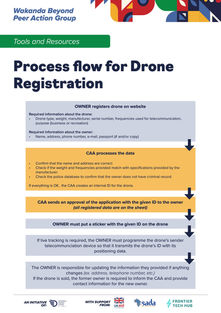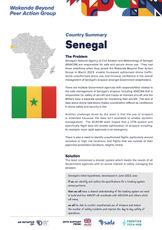

Registration
Registration was discussed throughout the Wakanda Beyond process with some countries, including Benin, Mauritania, and Senegal, making it the focus of their experimentation. This section summarizes the key insights on this topic.
About
The registration process collects essential details such as the drone's make and model, serial number, and the owner's name and address. Registration has two important components: one is the collection and processing of data and other is the storage of data.
This allows the CAA to know exactly how many drones are in the country, as well as provides information about the drone types, their purpose, and the owner. This information should be stored in a database that is easily accessible to the CAAs. Initially, CAAs didn't view developing a registration process as a high priority in comparison to other tools. However, through our discussions, it became evident that establishing a registration process is an essential first step for effectively implementing tools like UTM or tracking systems.
Why it is important
Member countries emphasized the importance of registering drones, pilots, and companies to ensure safety and security. The registration process is essential for several reasons:
-
It allows for precise identification of drones within the country, facilitating the generation of statistics to better align the CAAs' services with demand.
-
In the event of a crash, the CAA can swiftly identify and contact the drone's owner.
-
Knowledge of the specific type of drones in use allows the CAAs to better assess safety and security risks.
-
This data is foundational for the development of other safety measures, such as live tracking and Unmanned Traffic Management (UTM).
Things to consider
The dialogue among CAAs revealed a collective move towards digital solutions to enhance the registration process.
However, achieving this goal requires addressing several challenges, including balancing thoroughness with accessibility, ensuring data security, overcoming resource limitations, accommodating foreign drones, and incentivizing compliance.
A shared, open-source platform emerged as a promising strategy, supported by several countries for its cost-effectiveness and potential to foster regional collaboration and expertise. Below are some of the key considerations highlighted in our discussions.








